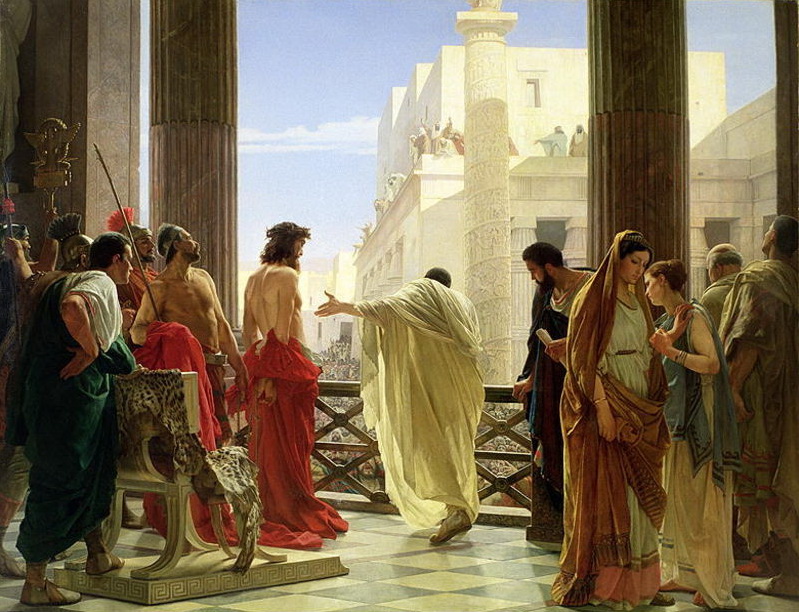Matthew 27:2,11-26
Mark 15:1-15
Luke 23:1-25
John 18:28-40;19:1-16
The chief priests, following their plan to kill Jesus, took him to the hall where Pontius Pilate, the Roman Governor of Jerusalem, could carry out their plan. These wicked chief priests, plotting to kill this most innocent of all, wouldn’t go into the Roman hall because it was not holy enough for them, so they stayed in the courtyard outside.
Pilate asked why they had brought him. They said Jesus was a malefactor, a criminal that ought to be punished by the Romans. Pilate told them to judge Jesus themselves, but they replied that according to the law, the Jewish leaders don’t have permission to put someone to death and that is what Jesus deserves.
Pilate took Jesus into the Judgement hall for questioning. He noted that Jesus had been called “King of the Jews” and asked Jesus if he were a king. Jesus gave the answer, “Thou sayest” which is an answer that affirms the question or statement. In other words, Jesus was saying, “Yes, it is as you said.”
Although Jesus was not afraid to claim the title of King, he also put Pilate’s mind at ease to any threat Jesus may be to Roman rule. Jesus said, “my kingdom is not of this world.” Jesus said that if his kingdom were of this world, then the servants of Jesus would fight to protect him, but that his kingdom is not of this world. He effectively told Pilate there would be no fighting.
The chief priests told Pilate all the reasons they thought why Jesus should be put to death. But Jesus said nothing.
Pilate said, “Hearest thou not how many things they witness against thee?”
Jesus still said nothing, which amazed Pilate. Pilate had probably seen many people argue passionately against accusations or plead for understanding, but Jesus remained perfectly calm and did not answer their false accusations.
Pilate told the crowd, “I find in him no fault at all.”

Then, noting that there was the annual tradition at the Jewish Passover that one prisoner should be released, Pilate seemed to have found a solution to this problem of having in custody an innocent man. Pilate said to the priests and the crowd of people, “But ye have a custom, that I should release unto you one at the passover: will ye therefore that I release unto you the King of the Jews?”
The chief priests said that Jesus had been causing trouble, stirring up the people from Galilee to Jerusalem. When he found out that Jesus was from Galilee, he sent Jesus to Herod, Roman governor over Galilee, who was in Jerusalem at the time.
Herod had long heard of Jesus and wanted to meet him; Herod wanted to see a miracle done by Jesus. Herod and his men questioned Jesus and made fun of Jesus, with the chief priests adding accusations, but Jesus answered nothing. Seeing that nothing was to come of this, Herod sent Jesus in a “gorgeous robe” back to Pilate.
Then Pilate told the chief priests and the people that neither Pilate nor Herod found any crime done by Jesus. This was the second time that Pilate told the chief priests and the crowd of people that Jesus was innocent. Pilate said he would give Jesus a small punishment and then release him.
But the crowd cried out “all at once” and yelled “Crucify him, crucify him!”
Pilot told the crowd to go and crucify him themselves “for I find no fault in him.” The priests told Pilate that, “We have a law, and by our law he ought to die” because Jesus said he was the Son of God. This made Pilate worry even more. Pilate was already impressed with Jesus and now Pilate heard that Jesus claimed to be the Son of God.
Back in the judgement hall, Pilate asked Jesus where he came from, but Jesus did not answer. Pilate couldn’t believe it. He told Jesus, “knowest thou not that I have power to crucify thee, and have power to release thee?”
Jesus told Pilate that “Thou couldest have no power at all against me, except it were given thee from above: therefore he that delivered me unto thee hath the greater sin.”
The Bible says that from that time Pilate tried to release Jesus, but the Jews cried out that if Pilate didn’t have Jesus crucified then Pilate must not be a friend of Caesar, the Roman Emperor.
For the third time, Pilate told the crowd, “I have found no cause of death in him” and he repeated his decision to punish Jesus lightly and let him go.
The soldiers had made a crown of thorns for this King of the Jews to wear along with the purple robe of royalty. Pilate presented this king in a crown of thorns to the crowd and said, “Behold your King!”
But the crowd cried out, “away with him; crucify him!”
Pilate answered, “Shall I crucify your king?”
And the crowd said, “We have no king but Caesar.”
The Bible says, “When Pilate saw that he could prevail nothing, but that rather a tumult was made, he took water, and washed his hands before the multitude, saying, I am innocent of the blood of this just person”
And though Pilate did not think Jesus was guilty of any crime, he sent Jesus to be crucified by Pilate’s Roman soldiers.
What do you think?
- Jesus was perfectly calm through the entire process. Should we try to be calm in all situations, like Jesus was? How can we do that?
- Pilot knew it was wrong to crucify Jesus, so why did he command to have him crucified? When you know something is wrong, but people pressure you to do it, how can you stand strong and choose the right way?
Previous: Jesus is Taken to Annas and Caiaphas for the Sanhedrin Trial
Next: Jesus is Crucified
Back to the Full List of Stories